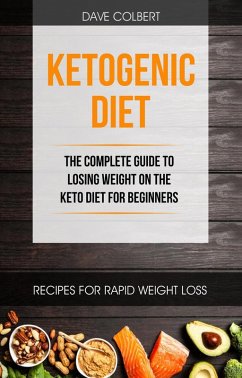
Ketogenic Diet Cookbook (eBook, ePUB)
Fast and Affordable Keto Recipes for Recovering Your Self-Confidence and Feel Beautiful Again
Versandkostenfrei!
Sofort per Download lieferbar
Statt: 21,99 €**
9,99 €
inkl. MwSt. und vom Verlag festgesetzt.
**Preis der gedruckten Ausgabe (Broschiertes Buch)
Alle Infos zum eBook verschenkenWeitere Ausgaben:

PAYBACK Punkte
0 °P sammeln!
The ketogenic diet is a low carb, high fat diet that is based on the principle of ketosis. It has been proven to help people lose weight in the short term and can also be used to reverse type 2 diabetes. Although it's still largely unproven, there are many studies supporting its efficacy. This book goes over how the keto diet works, as well as its benefits and risks for certain groups of people. You may decide that it's worth trying if you're not happy with your current state or if you're looking to use a different diet method for weight loss or diabetes reversal purposes. How Does the Keto Di...
The ketogenic diet is a low carb, high fat diet that is based on the principle of ketosis. It has been proven to help people lose weight in the short term and can also be used to reverse type 2 diabetes. Although it's still largely unproven, there are many studies supporting its efficacy. This book goes over how the keto diet works, as well as its benefits and risks for certain groups of people. You may decide that it's worth trying if you're not happy with your current state or if you're looking to use a different diet method for weight loss or diabetes reversal purposes. How Does the Keto Diet Work? The human body contains two types of fat: triglycerides, which are made of three parts fatty acid, one part glycerol (e.g. in lipids and oils), and one part sugar called dextrose; and the fat we're all familiar with, fatty acids. The ketogenic diet is based on the principle that having adequate levels of fats in the blood may be associated with improved metabolic function. It is based on the observation that people on a low-carbohydrate diet have higher levels of ketones in their blood than those who eat a carbohydrate-rich diet ? evident because fat is burned as fuel rather than converted to glucose for energy. This is because ketones have a greater energy efficiency and are less likely to be oxidized or damaged when used by the body. Thus, the diet aims to supply ample fat to fuel metabolic processes in the body and this is achieved by focusing on high-fat, low-carbohydrate foods. The Keto Diet: A Low Carb Approach to Weight Loss There are many different kinds of ketogenic diets doing the rounds, but all mainly share some common principles and approaches. Those principles could be summarized as: High fat, moderate protein and adequate fibre. High in fat, moderate in protein, low in carbohydrate. Having a maximum of 75 to 90 percent of calories from fat, up to 20 percent of calories from protein and 5 percent to 10 percent of calories from carbohydrates (depending on the version). [1] [2] [3] [4] [5] [6] The aim is to move the body into a state of what's called nutritional ketosis, or "nutritional ketosis with dietary carbohydrates," which is when you have such a high fat diet that your system converts fat rather than sugar into energy for use by the body. This is different from ketoacidosis, a life-threatening condition that occurs when you have too many ketones in your bloodstream, and it's usually triggered by high amounts of protein in the diet
Dieser Download kann aus rechtlichen Gründen nur mit Rechnungsadresse in A, B, BG, CY, CZ, D, DK, EW, E, FIN, F, GR, H, IRL, I, LT, L, LR, M, NL, PL, P, R, S, SLO, SK ausgeliefert werden.













